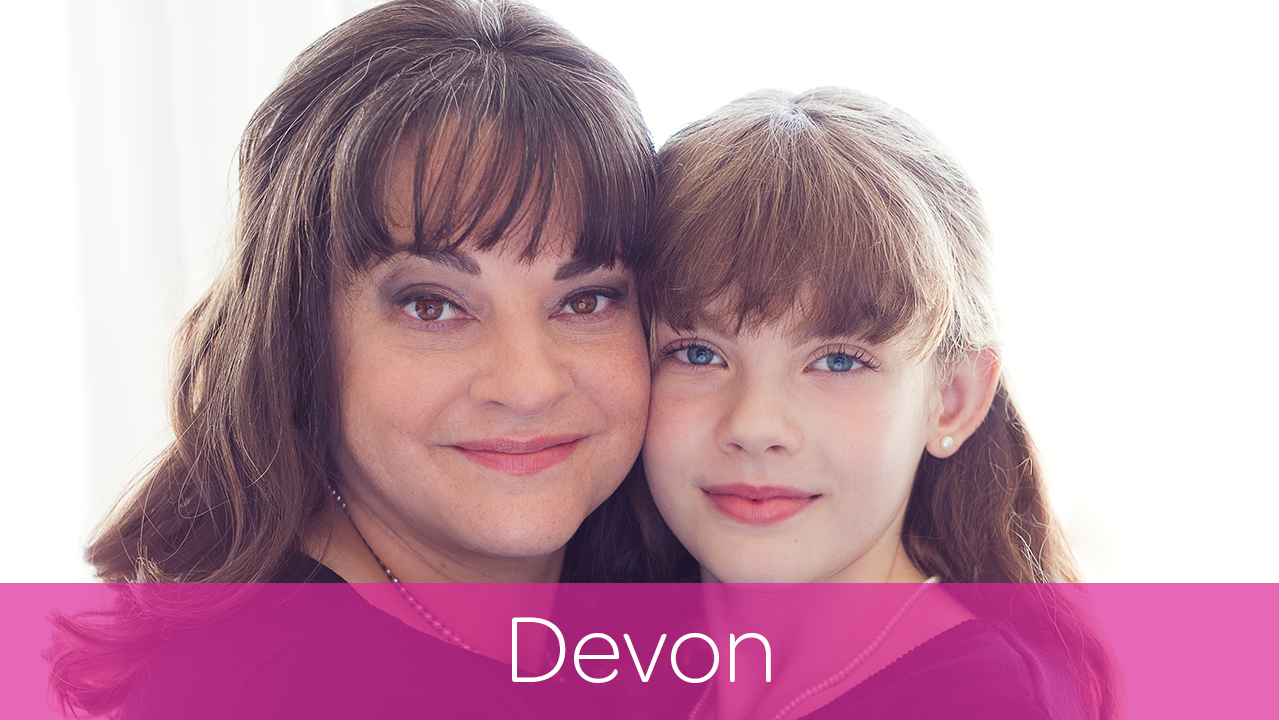Devon and her Obstetrician/Gynecologist always had a good rapport. During their decade-long relationship as patient and physician, Devon credited her doctor with maintaining her health, saving her daughter’s life despite delivery complications, and generally making each appointment pleasant. Nevertheless, as she waited for her doctor in the examination room this time, she realized she was anxious about this particular check-in.

After learning about Dr. Weidhaas’ co-discovery of the KRAS-variant from her mother — a breast cancer survivor, Army of Women research study participant, and carrier of this marker — Devon sought out more information about the new discovery and its test. She knew that she had a 50% chance of inheriting the KRAS-variant, and was extremely concerned about the implications for her health, as well as that of her young daughter. “Knowing what my mom had gone through with her cancer diagnosis and treatment made me frankly terrified to find out if I would be a carrier of the KRAS-variant as well — not just for my own health and wellbeing, but also because the thought of not being there for my daughter’s future would be devastating. I wanted to be able to make informed decisions for myself, and, should my daughter also unfortunately be a carrier, to be able to ensure that she have access to any healthcare options she would need.”
Along with a long-held personal interest in medical issues, Devon felt comfortable navigating the scientific jargon, having already completed the “23andMe” genetic test and the BRCA test in the wake of her mother’s diagnosis. “The ability to determine whether or not I had inherited the KRAS-variant through a simple — and comparatively inexpensive — saliva test seemed like an easy decision, and I fully expected that my doctor would be completely onboard with the idea.” However, for the first time, Devon’s exchange with her doctor that day left her feeling more frustrated than peaceful.
At a time when patients could not order the KRAS-variant test on their own, Devon required her doctor’s approval before moving forward. She had familiarized herself with the MiraKind website and brought a copy of its FAQs, thinking the questions they addressed would make ordering the test “a breeze.” Her doctor’s unfamiliarity with the KRAS-variant and sudden departure from the room confused Devon, but after consulting with other staff and offering another BRCA test, the OB/GYN’s eventual response shocked her. “This is what we have decided to do with you,” her doctor stated, before referring her to an oncologist. In an instant, their amicable relationship became tense and Devon now felt like a pest rather than a patient.
Once at the oncologist’s office, Devon could not shake how out of place she felt in the waiting room “wasting this doctor’s time… surrounded by people who were processing devastating news and fighting for their lives.” She was referred to the practice’s resident genetic counselor who, like the previous health professionals, “was completely flummoxed” as to why anyone would seek out the test and inquired what Devon would do if she was found to have the KRAS-variant. Devon thought it was obvious. “I have a small daughter. I need to be alive for her. Shouldn’t I consider [the] higher surveillance or prophylactic surgeries [a positive result might mean]?” She realized that despite her location in North Carolina near prestigious universities and medical centers, the local health community was not yet aware of, and maybe not yet ready to consider, the impact that the prevalence of the KRAS-variant might have on the community. Though she had anticipated a positive reaction from her care team, thinking they would be open to sharing this news with their other patients, she recalls them appearing somewhat offended and incredulous. “They were all very well versed in BRCA-related information, and were certainly ready and willing to help in that regard, but the KRAS-variant was outside of their comfort zone. I think the sense of frustration was mutual, but I couldn’t give up, knowing the affect that my results could have on my daughter’s future.”
Despite the resistance she met, Devon found support elsewhere, calling the MiraKind family “fascinating and vibrant” and appreciative that it can provide a sense of community to women on all stages of their journey, no matter where they are. “My own MiraKind story took an exciting turn just before Thanksgiving. After months of trying to find a resolution locally, the phone rang and I was shocked to find Dr. Weidhaas on the other end. I was sure that the only way the doctor could possibly have time to call me personally would be because she had bad news. It was truly emotionally overwhelming to hear from Dr. Weidhaas herself that I was not a carrier.” Devon continued by remarking on Dr. Weidhaas’ ability to offer personal connection to her patients and all members of the community, “She truly gives care not just service.” She only laments that “many women still don’t know about this [the KRAS-variant]” and hopes that her ability to share her story as a MiraKind community member will mean more women will gain access to this powerful information, and by extension, control over their own health choices.
You can apply for a KRAS-variant study here and order your results.
Photo credits: Windmill Photography



Leave a Reply